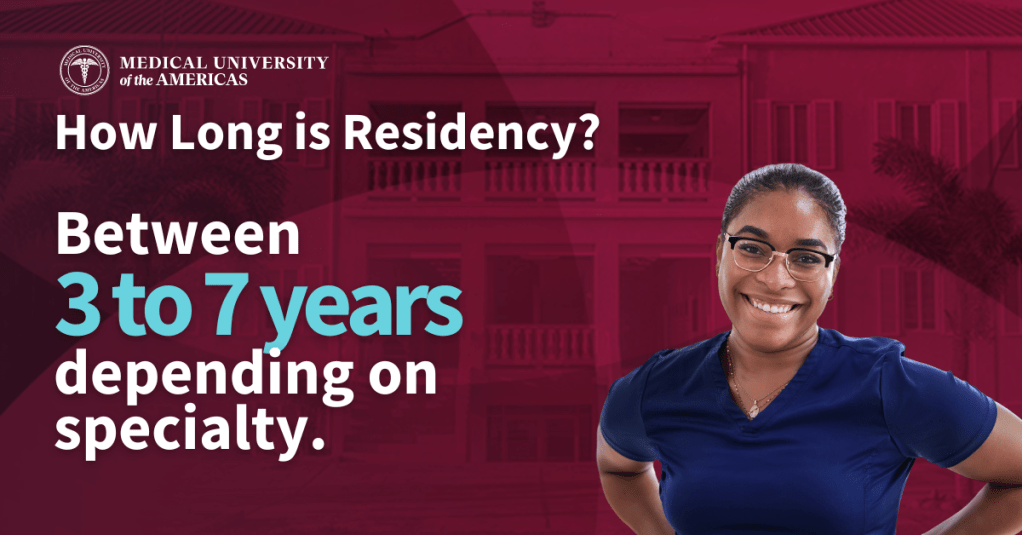
What Is a Medical Resident and How Long Is Residency?
Discover everything you need to know about medical residencies.
Last updated: February 10, 2025.
If you aspire to become a doctor, you may think that getting accepted into a medical program is your end goal. However, once classes begin, you will quickly realize that medical school is just the start of your journey towards becoming a licensed physician. There are many different stages both during and after medical school. Residency training may take place after you’ve received your MD, but it is one of the most important parts of your journey.
You probably already have a basic idea of what being a resident doctor involves. You may have even heard about the experiences of alumni who graduated a few years ago from your program. However, if you think you may be missing some information or want to understand medical residency programs better, read on and find out more about what you can expect when you embark on your residency journey.
What Is a Residency for Doctors?
A medical resident is a medical school graduate with a Doctor of Medicine (MD) degree who participates in a post-graduate training program accredited by the Accreditation Council for Graduate Medical Education (ACGME). Medical residents work in hospitals or doctors’ offices to continue their education and medical training in a specialized field. This is referred to as a ‘residency.’ During their residency, a resident doctor provides direct patient care, including diagnosing, managing, and treating health conditions and injuries.
First-year residents are known as PGY-1 (postgraduate year one) or interns, because the first year of residency is considered an internship. Interns become residents in the second year of their residency as they focus more on their field of specialty. After completing residency, those who advance on to subspecialties are called fellows, and their training is called a fellowship.
How Does Residency Work?
All resident doctors are required to complete medical school with a degree, such as a Doctor of Medicine. To enable residents to provide care during their residency, they must obtain a license from the jurisdiction or state where they work. Junior residents may have a restricted training license but will need to obtain a full, unrestricted license to continue their training or start their own medical practice. During their residency, a resident physician will continue their learning by gaining increasing responsibility while under the supervision of doctors or senior residents. Residents will also have the opportunity to work with patients long enough to observe how illnesses and conditions evolve.
An example of this is Dr. Vijitha Mahalingam, a proud MUA alum and current 4th-year Psychiatry resident at Queen’s University in Kingston, Ontario. Since graduating from MUA in 2019, Dr. Mahalingam has focused on mental health care and making a meaningful impact in her field.
Medical Residency Placements
Medical students typically decide which speciality or field they wish to specialize in during their fourth year of medical school. They may choose fields such as anesthesiology, obstetrics/gynecology, pediatrics, radiology or surgery. This will then guide them as they decide which medical residency programs they should apply to.
Residency Match
For students participating in the National Residency Matching Program (NRMP), it is the culmination of a year’s work. During the first half of their senior year, medical students apply for their chosen accredited residency programs at a US teaching hospital or medical center. After they have submitted their application, visited the program sites and been interviewed by the program directors, they will submit their preferred residency choices in order of preference. Simultaneously, the residency program directors will also submit a list of the students they interviewed in preferred rank order. Both lists are then submitted to the NRMP, matching students with a residency program. Finally, around the end of March, during the students’ final semester, known as Match Day, students find out if they have been matched to a residency program. In most cases, students will match with one of their top three preferred residency programs.
Preparing for Residency
Before starting residency, there are some different ways you can lay the foundation for your success. An excellent place to start is by finding great mentors. There is nothing more valuable to your training and development than learning from a professional. For instance, if your mentor is a technically superb transplant surgeon, they are likely to instruct you in all the ways that helped them achieve their status. It is also helpful to get into the mindset of being a lifelong learner. Embracing the attitude that continuous education and maintaining board certification are all part of being a physician will significantly benefit you.
What is a Resident Physician?
Medical residents work in doctors’ offices or hospital departments such as emergency departments, intensive care units, general patient wards and operating rooms. As a doctor in training, an office or hospital resident will develop their skills in giving examinations, laboratory work, ordering and interpreting diagnostic tests, performing medical procedures, recording medical histories, and mental and physical self-care. They will also gain experience in the disclosure of adverse events or delivering bad news.
In hospitals, most of the residency medicine work and training will occur during rounds — when a group of doctors and health care professionals go from patient to patient to assess their condition, progress and treatment. Alternatively, a resident may work in a doctor’s office or outpatient clinic, assisting with patient examinations and treatments. Residents may also spend time helping coordinate services for patients alongside other health care team members.
How Long Is the Residency Program?

You may be wondering, “How long is MD residency?” While most residences last between 3 and 7 years, the length of a medical residency will largely depend on the specialty you choose to pursue. For instance:
| Specialty | Length of Residency |
|---|---|
| Family medicine practice | 3 years |
| Internal medicine | 3 years |
| Pediatrics | 3 years |
| Obstetrics and Gynecology | 4 years |
| Emergency Medicine | 3-4 years |
| Urology | 5 years |
| General Surgery | 5 years |
| Plastic Surgery | 6 years |
| Neurosurgery | 7 years |
If you are considering pursuing a highly specialized field of medicine, such as reconstructive surgery, pediatric radiology or female pelvic medicine, you will need to complete additional fellowship training after your residency.
How Much Do Medical Residents Make?
If you are wondering how much a residency doctor makes, salaries among medical residents vary just as they do for any other profession. Geographic location, length of experience and field of specialty will together influence a resident’s earning potential. In 2024, according to the Residents Salary and Debt Report, the average salary for first-year medical residents in the U.S. was approximately $63,000 USD. This tends to increase by $2,000-$5,000 USD each successive year spent in a residency program.
Residents are also eligible for several benefits. The exact breakdown of benefits a resident is eligible for depends on which program they join, but can include:
- Medical resident salary
- Health insurance
- 2 to 4 weeks paid vacation time
- Contributions towards meals and parking
What Happens After a Medical Residency?
Once you complete your medical residency program, there are several avenues you can take. For example:
Fellowships
Some doctors decide to continue their training after their residency by going on to complete a fellowship. A fellowship is at least one more year of study, usually in the subspecialty of their residency, to learn more cutting-edge techniques. Doctors who become fellows are often considered to be experts in their chosen field.
Practice
After completing their residency program, doctors can apply for an unrestricted medical license. They will then have the option to find employment in private practice, group practice, or become employed by a clinic or hospital.
Board of Certification
Many doctors decide to earn board certification in their field of specialty after their American Board of Medical Specialties accredited residency comes to an end. Board certification is a voluntary qualification that reflects your knowledge in a certain field, such as internal medicine, orthopedics, pediatrics or pathology.
Your journey towards securing the best residency medical program for you starts with a great medical school. So, if you want to begin a fulfilling and successful career in medicine, contact us today to find out more about our MD program.
FAQs About Medical Residents
Medical residency programs begin after medical school is over, when new Doctors of Medicine begin working on-site in hospitals, clinics and doctors’ offices to develop their skills and knowledge. They provide real care, diagnose illnesses and collaborate with experienced professionals in their medical field of choice. Completing a residency is an essential part of the journey towards practicing independently as a fully-licensed physician.
A hospital resident is an MD program graduate who has matched into a hospital-based residency program that will allow them to develop key knowledge and abilities in a medical field of their choosing. Depending on the specialty, the resident will spend 3-7 years working on-site, learning from experienced professionals, and preparing themselves for licensure and independent practice in that field.
Residency is a specialized training program for new MD graduates. New doctors will enter residency after medical school and spend 3-7 years focused on a medical specialty they hope to practice. This time will allow them to learn from current professionals and develop their key abilities, and is essential for their future licensure and practice opportunities.
Recent graduates of an MD program often go on to work in a residency program in order to enhance their knowledge and skills, and to meet independent licensing requirements. A residency program can last from 3-7 years, depending on the specialty chosen. Family medicine is generally a three year residency, whereas Neurosurgery will be a seven year residency.